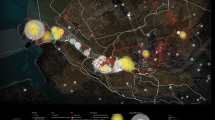Abstract
Climate change, and its disturbing implications, increases interest in sustainable living and development of ecocities. Intending to re-build society using ecological solutions, various governments and organizations are challenging themselves to produce ecocity models and evaluation systems. Urban metabolism, measuring a city’s resource flows, is a common evaluation approach. This research project uses urban metabolism to assess waste reduction, reinforcing resilience of circular metabolisms, by two ecocities. Key performance indicators, planning principles, and adherence to international green building guidelines are used to quantitatively calculate the effectiveness of the Sino-Singapore Tianjin Ecocity flagship cooperation project between the governments of Singapore and China and the Dockside Green project in Canada. Qualitative data, including reviews from prominent sustainability researchers, are also evaluated. Findings suggest that the effectiveness of both ecocity models were inhibited by the practicality and feasibility of their master plans; in particular, several quantitative goals for bending the urban metabolism were unsuccessful. A hybrid model is introduced with principles and guidelines for optimizing previous prototypes and proposing feasible solutions to create a flexible template for achieving circular metabolism. It utilizes the quantitative indicators that were shown to be effective across both case studies and takes into account their viability by applying qualitative feedback.
Access this chapter
Tax calculation will be finalised at checkout
Purchases are for personal use only
Similar content being viewed by others
References
Bott, H., S. Anders, and G.C. Grassl. 2018. Nachhaltige Stadtplanung: Lebendige Quartiere, smart Cities. DETAIL: Resilienz.
Caprotti, F. 2014. Critical research on eco-cities? A walk through the Sino-Singapore Tianjin Eco-City, China. Cities 36: 10–17.
Dockside Green. 2014. Dockside Green 2014 Annual Report.
Geroe, S.J.W. 2017. The sino-singapore tianjin eco-city: A case study of Chinese experimental regulatory and institutional development. International Journal of Sustainable Development and Planning 12 (6): 987–994.
IPCC (Intergovernmental Panel on Climate Change). 2014. Climate Change 2014 Synthesis Report.
Lagally, M.G. 2013. LEED. Encyclopedia of Materials Characterization.
Register, R. 1987. What is an Ecocity? Earth Island Journal 2 (4): 31–33.
Roseland, M. 1997. Dimensions of the eco-city. Cities 14 (4): 197–202.
Smith, R., and K. Miller. 2013. Ecocity mapping using GIS: Introducing a planning method for assessing and improving neighborhood vitality. Progress in community health partnerships: research, education, and action 7 (1): 95–106.
World Bank. 2009. Sino-Singapore Tianjin Eco-City: A Case Study of an Emerging Eco-City in China.
Author information
Authors and Affiliations
Corresponding author
Editor information
Editors and Affiliations
Rights and permissions
Copyright information
© 2020 The Editor(s) (if applicable) and The Author(s), under exclusive license to Springer Nature Switzerland AG
About this chapter
Cite this chapter
Xu, C., Nguyen, S., Whangbo, J., Aibin, M. (2020). A Hybrid Model for Sustainable Urban Metabolism in Metropolitan Communities. In: Moore, J., Attia, S., Abdel-Kader, A., Narasimhan, A. (eds) Ecocities Now. Springer, Cham. https://doi.org/10.1007/978-3-030-58399-6_8
Download citation
DOI: https://doi.org/10.1007/978-3-030-58399-6_8
Published:
Publisher Name: Springer, Cham
Print ISBN: 978-3-030-58398-9
Online ISBN: 978-3-030-58399-6
eBook Packages: HistoryHistory (R0)




